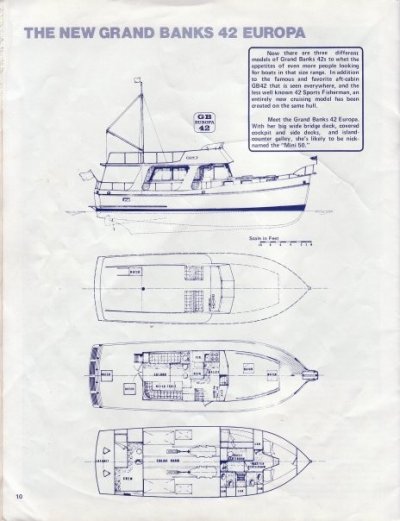John--- Here's a link that Vinny sent me for a very interesting GB42 Europa.
http://www.yachtworld.com/core/listing/boatFullDetails.jsp?boat_id=1703941&checked_boats=1703941&ybw=&units=Feet&access=Public&listing_id=76144&url=
Notice that it has a small transverse stateroom in the lazarette accessed via a ladder trhough a hatch in the aft deck.* I had never seen an arrangement like this before so posted the link on the GB owners forum with a question about the configuration.* Got a reply from the son of the first marine engineer American Marine hired when*they started to build GBs in Kowloon in the 1960, the "Kong" of Kong and Halverson.* He attached a plan for the orignal GB42 Europa which was introduced in wood in the early 1970s.* He said the lazarette*crew cabin--- which was intended for a hired hand--- was a standard feature in all the wood GB42 Europas, and you can see it in the bottom drawing of the plan.* It was apparently dropped when the GB42 Europa*was switched to fiberglass but American Marine obviously retained the ability to install one if a buyer wished.
It's kind of a neat idea, actually. The one in the woody GB42EU even had it's own toilet as does the one in the fiberglass boat in the link.* The crew cabin in the fiberglass boat has a full berth and a 3/4 berth and theoretically can sleep two adults.* The one in the woody, which was a*smaller hull, appears to have just the one berth.*
If a boating couple had a kid, this would be a great place to keep it.* You wouldn't want to be claustrophobic, however, although it appears there was a small portlight in the side of the wood boat for light and, if it opened, fresh air.* Doesn't look like there is one on the port side and the fiberglass GB in the link doesn't have one at all.
I have no idea what the crew cabin did to access to things like the steering gear, exhaust hoses, etc.
Based on the description of the boat, the asking price of $195,000*is amazingly low.* You'd have to learn to love taking care of exterior wood, however.
-- Edited by Marin on Wednesday 20th of January 2010 02:01:30 AM
http://www.yachtworld.com/core/listing/boatFullDetails.jsp?boat_id=1703941&checked_boats=1703941&ybw=&units=Feet&access=Public&listing_id=76144&url=
Notice that it has a small transverse stateroom in the lazarette accessed via a ladder trhough a hatch in the aft deck.* I had never seen an arrangement like this before so posted the link on the GB owners forum with a question about the configuration.* Got a reply from the son of the first marine engineer American Marine hired when*they started to build GBs in Kowloon in the 1960, the "Kong" of Kong and Halverson.* He attached a plan for the orignal GB42 Europa which was introduced in wood in the early 1970s.* He said the lazarette*crew cabin--- which was intended for a hired hand--- was a standard feature in all the wood GB42 Europas, and you can see it in the bottom drawing of the plan.* It was apparently dropped when the GB42 Europa*was switched to fiberglass but American Marine obviously retained the ability to install one if a buyer wished.
It's kind of a neat idea, actually. The one in the woody GB42EU even had it's own toilet as does the one in the fiberglass boat in the link.* The crew cabin in the fiberglass boat has a full berth and a 3/4 berth and theoretically can sleep two adults.* The one in the woody, which was a*smaller hull, appears to have just the one berth.*
If a boating couple had a kid, this would be a great place to keep it.* You wouldn't want to be claustrophobic, however, although it appears there was a small portlight in the side of the wood boat for light and, if it opened, fresh air.* Doesn't look like there is one on the port side and the fiberglass GB in the link doesn't have one at all.
I have no idea what the crew cabin did to access to things like the steering gear, exhaust hoses, etc.
Based on the description of the boat, the asking price of $195,000*is amazingly low.* You'd have to learn to love taking care of exterior wood, however.
-- Edited by Marin on Wednesday 20th of January 2010 02:01:30 AM


